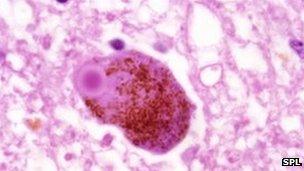Glasgow University leads biggest study into Parkinson's disease
- Published

A Glasgow-based doctor is to lead the world's biggest research study into the cause of Parkinson's disease.
The brain condition affects almost 130,000 people in the UK.
Dr Donald Grosset, a neurologist at Glasgow University, said he hoped to find better ways of both diagnosing and treating the disease.
Charity Parkinson's UK is looking for 3,000 volunteers with the condition - and their siblings - to take part in the study.
Parkinson's is a debilitating condition with symptoms which include tremors, mood changes, movement difficulties, loss of smell and speech problems.
The charity said it was investing more than £1.6m in the Tracking Parkinson's study with the long-term aim of boosting the chances of finding a cure.
The study will follow 3,000 volunteers - people recently diagnosed with the disease, people diagnosed aged under 50 and their brothers and sisters.
The aim is to identify markers in the blood which could be used to create a simple diagnostic test for the disease, something which does not yet exist.
Parkinson's UK said early diagnosis is crucial if doctors are to be able to prescribe the right drugs for people with the condition.
The responses to various treatments of those taking part in the study will be closely monitored for up to five years.
Eventually the project will link up to 40 research centres across the UK.
Dr Grosset said: "The cure for Parkinson's is a global challenge and all the samples gathered from our thousands of volunteers will be available for analysis by researchers the world over.
"This, in itself, will speed up our ultimate goal - to develop a cure for Parkinson's.
"I am very excited to be leading this cutting edge research collaborating with top researchers from Scotland, England, Wales and Northern Ireland."
Dr Kieran Breen, director of research and innovation at Parkinson's UK, added: "Finding a cure for Parkinson's is like building a gigantic jigsaw, but we still have a number of the pieces missing.
"This vital new study will help us fill in some of the gaps in our knowledge."
- Published15 April 2012
- Published8 February 2012
- Published17 June 2011
- Published17 June 2011
- Published2 February 2011
- Published8 November 2011